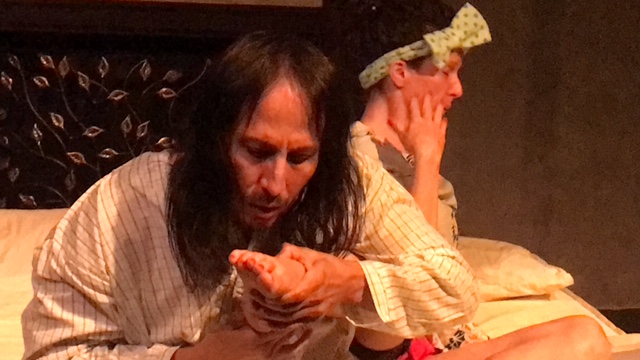On Goddesses, Kings, and Bedroom Troubles

By Verónica García Moreno
Rey y Atenea by Susannah Rodríguez Drissi
Starring Magdalena Edwards and JD Mata
(Rey y Atenea premiered at the Short+Sweet Hollywood Festival, at the Lee Strasberg Theatre and Film Institute on October 12th, 2019)

The worst theatergoer is always the one with tickets to the show. This is precisely why I make it a point to attend the theater as seldom as possible. How else does one truly enjoy that strangely familiar experience that is life on a stage? From that shadowy space, we enter stories in medias res, experiences entailing voyeurism, exhibitionism and, in some measure, desecration. When the theatrical performance also takes place in an intimate venue — namely the prestigious Lee Strasberg Theatre and Film Institute in West Hollywood — and the setting is a matrimonial bedroom — with such gifted actors as Magdalena Edwards and JD Mata — the experience is one of delicious restlessness.

But such deliciousness is already in place before the proverbial curtain is raised, as the play’s title is as uninformative as it is seductive: Rey y Atenea [Athena and the King]. Are we preparing to attend a Greek drama? Is the King a real king, or is the title merely an affectionate nickname in Spanish? Or, is it a common name? What about Athena? Is she really the goddess of war and wisdom, or the product of a lustful king’s reverie to lie in bed with divinity? Who isn’t living up to their name? Who is the imposter? Are they both? Or, is it the attending public unable to name the spectacle before them? Because, ultimately, Rey y Atenea revolves around the definition of identity against the other, and the balance of power around that very difference.

And, in what social apparatus are difference, intimacy, secrets, and the organization of space more obvious than in the traditional couple?
Rey y Atenea enjoys an almost minimalist deployment of media, both scenic and narrative. The decoration is limited to a couple of beds, a bench, scissors, and a small can of rice. The dialogue, although sparse, is full of insinuations, where what is left unsaid weighs a great deal more than what is actually said. Ironically, it will be the play’s extraliterary elements that clue us into the play’s unusual tension. Atenea enters the stage dancing, while caressing a pair of scissors that she will soon hide in a gun holster under her dress. The scissors, a phallic symbol of female power — effective, dangerous, and secret to the eyes of men — disappear from the public’s view, as soon as Rey, her husband, enters the stage. From the outset, then, the audience has access to a hidden reality that Rey neither sees nor could imagine. And that involves us in the action and empowers us in front of Rey. At the same time, once deployed, the scissors suggest future violence — as participant observers, we’re kept in suspense.
The scissors Atenea hides under her dress are replicated in the small scissors Rey uses to trim his toenails and, in a scene of enchanting marital intimacy, also Atenea’s. The closeness between their bodies, Atenea’s relative nakedness, Rey’s suggested impotence, and Atenea’s sudden shift in temperature from cold to hot (or vice versa) endows the action with physicality that is both endearing and disturbing.
Forced into proximity by a strip of fabric tying the beds together, both protagonists know that their closeness is, at best, a deliberate attempt at intimacy. Is it custom, society, or necessity that prompts Atenea to tie the beds to each other, as if their natural tendency were to separate? When Rey finally falls asleep, after an unsuccessful attempt at solving his wife’s troubles with the hot and cold of their relationship, Atenea takes out her scissors and cuts the strip of fabric forcing the beds together — at once separating the beds and, thus, reconquering her individual space. Now joyful and exuberant, Atenea jumps out of bed and dances again, much like she did at the beginning of the play. And she continues dancing for herself and for the spectator’s delight until the stage turns dark and the music stops. For those of us sitting in the audience, however, she might as well dance forever.
Verónica García Moreno is a Spanish scholar, journalist, and award-winning poet and writer. As an orientalist and a linguist, she has been faculty in European and North American universities. Currently, she lives in Los Angeles and teaches language and literature at UCLA, where she pursues a doctoral degree in the Department of Spanish and Portuguese.



